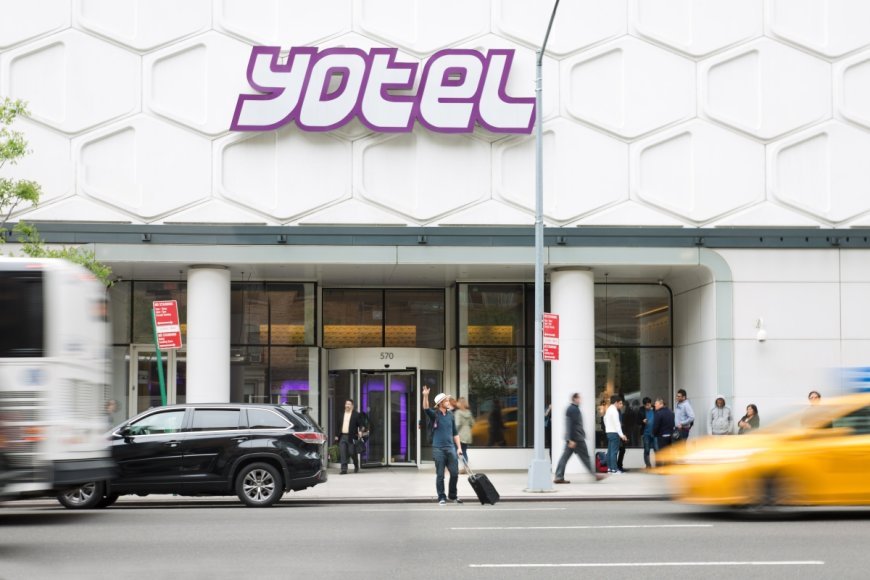Yotel Eyes Growth as Al Bahar Group Takes Near-Total Control

Yotel, the UK-based hospitality management company, is entering a new phase of expansion following a shift in its ownership structure.
With Al Bahar Group increasing its stake to more than 95% by acquiring an additional 30% from Starwood Capital, CEO Hubert Viriot said the simplified governance will allow the brand to move more decisively as it targets doubling its global portfolio to 15,000 rooms by 2030.
“These are investors who are well aware of the business, who are very familiar with Yotel,” Viriot told Hospitality career profile. “They have seen its growth and have realized there is still a hell of a lot to do, and this company still has huge potential.”
Previously structured as a joint venture with Starwood Capital and Al Bahar Group, according to Viriot, the change brings “more agility” and the freedom to focus on the long term without the pressure of short-term returns from institutional investors.
“When we look at the long-term strategy of the business, we have a little bit more leeway in which direction we grow, in which markets, and what types of contracts we go into,” he said.
Strategic Growth in Established Markets
Rather than chasing new markets, Yotel’s immediate focus is on scaling within regions where it already has a presence. The strategy involves deepening its footprint through regional clusters and feeder markets, especially in Asia and Europe.
“The real objective right now is not necessarily to continue expanding in many new markets, but first and foremost, focus on markets we’ve opened in and grow within these,” Viriot said.
For example, after opening hotels in Singapore, Yotel is now targeting neighboring countries like Thailand, Malaysia, and Indonesia to reinforce brand visibility and create a regional network of properties.
Yotel is also adapting its growth model based on market maturity. In more established markets, it will prioritize management contracts, while in newer or less saturated regions, such as Japan, it may look to franchise agreements or partnerships with local operators.
Market Volatility
Across its portfolio, Yotel currently operates 23 hotels in 16 cities and airports worldwide, with 11 more hotels set to open over the next two years.
While the macroeconomic outlook remains uncertain, particularly with rising international tensions and fluctuating travel demand, Viriot remains pragmatic.
“What business wants is stability. Tourists want to know what’s going to happen,” he said. “Decisions are currently being stalled, and so forth. While we see an immediate short-term impact, will it be transformative in the long term? I don't know, but I don't think so.”
Hybrid Hospitality as a Growth Engine
Yotel’s three-brand strategy is central to its future. The Yotel brand caters to urban travelers. YotelAir targets high-traffic travel hubs, such as airports, and YotelPad is the newest concept, blending hotel services with residential features.
While YotelAir remains a niche but high-performing segment — especially in locations like Istanbul — the bulk of current and future growth is concentrated in Yotel’s city hotels and the newer YotelPad format.
“Where there is a tremendous opportunity, where we have started tapping into, is YotelPad, and that's where I see the future of hospitality is, to a certain extent, increasingly hybrid products,” said Viriot.
This shift aligns with broader trends in the industry, where long-stay, flexible-use properties are increasingly in demand from both travelers and investors.
This is also reflected in a recent Hospitality career profile Megatrend, where many hotel companies are focusing on how to capitalize on the rising demand for hybrid travel experiences that blend short and long stays.
Across its portfolio, Yotel is currently operating at around 85% occupancy, with some airport properties regularly hitting triple-digit occupancy during peak hours. The company’s average daily rate globally exceeds $185, according to Viriot, who noted that performance metrics are exceeding internal expectations.
Innovation in Tech and Real Estate Strategy
From contactless check-ins to building conversions, Yotel is doubling down on innovation not just in guest experience, but also in how hotels are built and operated.
The company is piloting a fully automated guest experience at its London Stratford hotel.
“It is a fully automated experience, which means our customers can entirely navigate their stay on their own from checking in, entering the hotel, and ordering, without any human assistance,” said Viriot. “If they need human assistance, it is there, but the point is to create such a seamless experience that it will not be required.”
Yotel continues to pursue conversions of underused office buildings into hotels, a strategy that aligns with both environmental goals and time-to-market advantages. However, regulatory hurdles often delay these projects.
Yotel has also found success converting unbranded hotels, particularly in Europe, into branded properties that meet its design and service standards.
“In Europe, there are a lot of unbranded hotels where room sizes are typically quite limited,” Viriot said. “We see a number of opportunities for us to convert existing hotels into a Yotel standard, and it is more straightforward than we thought.”


 Abhishek Mukherjee
Abhishek Mukherjee 
